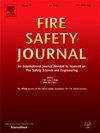热失控模型对停车场火灾危险影响的数值研究及对锰氧化物锂离子电池的应用
IF 3.3
3区 工程技术
Q2 ENGINEERING, CIVIL
引用次数: 0
摘要
本文介绍了对混凝土停车设施内日产 LEAF 2011 电动汽车起火的数值模拟。文章分析了热失控的热化学特性变化,并评估了这些变化对混凝土结构和附近停放车辆所接收热量的影响。确定了三个关键参数:流经压力通风口的气体成分、相关流速和峰值热释放率。这些参数是独立确定的,通过调整排出气体燃烧反应的化学计量来关闭模型。进行了四次模拟以捕捉不确定性。在每次模拟过程中,都会对混凝土和邻近停放汽车的净热通量和表面温度进行监测。研究包括输入变量对净热通量和表面温度影响的敏感性分析,以及了解内部热释放作用的调查。气体混合物成分、热释放率和内部热释放的变化对燃烧汽车周围产生的热条件影响很小,因为乘客舱内聚合物的燃烧驱动了总热释放率。本文章由计算机程序翻译,如有差异,请以英文原文为准。
Numerical investigation of the influence of thermal runaway modelling on car park fire hazard and application to a Lithium-ion Manganese Oxide battery
This article presents numerical simulations of a Nissan LEAF 2011 electric car fire inside a concrete parking facility. Variations in the thermo-chemical properties of thermal runaway are analysed, and the way they affect the heat received by the concrete structure and a nearby parked vehicle is evaluated. Three key parameters are identified: the composition of the gas flowing through the pressure vent, the associated flow rate, and the peak heat release rate. These parameters are established independently, and the model is closed by adjusting the stoichiometry of the combustion reaction of the vented gas. Four simulations are conducted to capture the uncertainty. The net heat flux and surface temperature on the concrete and on a neighbouring parked car are monitored during each simulation. The study includes a sensitivity analysis of the impact of input variables on the net heat fluxes and surface temperatures, and investigations are carried out to understand the role of internal heat release. Variations in the gaseous mixture composition, heat release rate, and internal heat release have little impact on the resulting thermal conditions around the burning car because the combustion of the polymers in the passenger cabin drives the total heat release rate.
求助全文
通过发布文献求助,成功后即可免费获取论文全文。
去求助
来源期刊

Fire Safety Journal
工程技术-材料科学:综合
CiteScore
5.70
自引率
9.70%
发文量
153
审稿时长
60 days
期刊介绍:
Fire Safety Journal is the leading publication dealing with all aspects of fire safety engineering. Its scope is purposefully wide, as it is deemed important to encourage papers from all sources within this multidisciplinary subject, thus providing a forum for its further development as a distinct engineering discipline. This is an essential step towards gaining a status equal to that enjoyed by the other engineering disciplines.
 求助内容:
求助内容: 应助结果提醒方式:
应助结果提醒方式:


